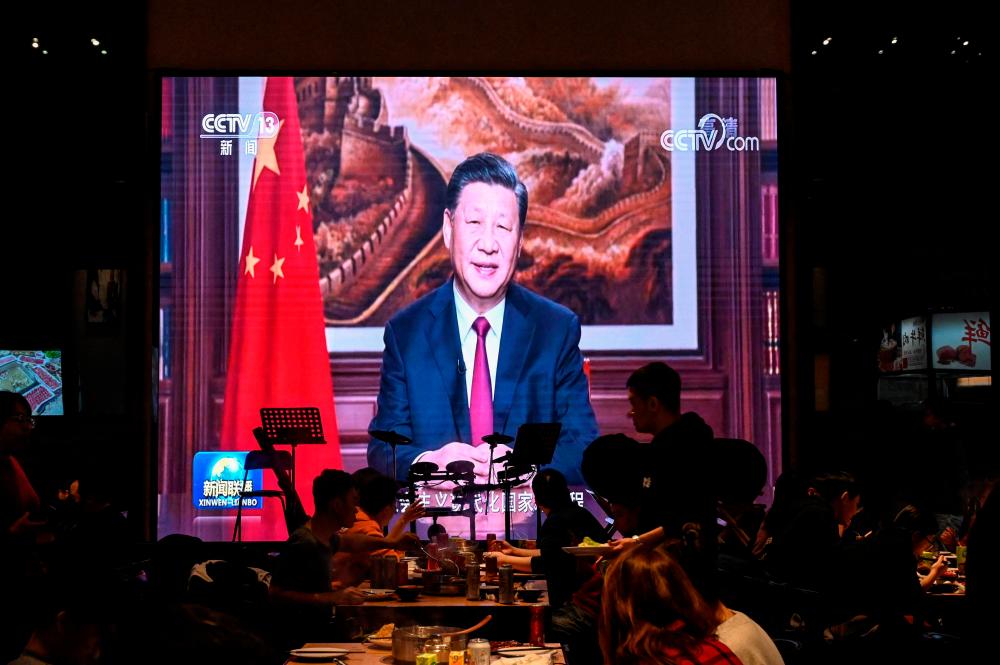BEIJING: Chinese President Xi Jinping held a video call with UN rights chief Michelle Bachelet on Wednesday, as she visits Xinjiang during a mission overshadowed by fresh allegations of Uyghur abuses and fears she is being used as a public relations tool.
China’s Communist Party is accused of detaining over one million Uyghurs and other Muslim minorities in the far-western region as part of a years-long crackdown the United States and lawmakers in other Western countries have labelled a “genocide”.
As part of a long-awaited visit Bachelet is expected to visit the cities of Urumqi and Kashgar on a six-day tour that has been dogged by concerns from Western officials, diplomats and rights groups that the Communist Party will attempt to use it to whitewash abuses.
China vehemently denies the allegations, calling them the “lie of the century”.
The United States has reiterated its view that Bachelet's visit was a mistake after the release of thousands of leaked documents and photographs from inside the system of mass incarceration this week.
And activists have voiced concern that Beijing will prevent Bachelet from conducting a thorough probe into alleged rights abuses and instead give her a stage-managed tour.
But Xi defended his country's human rights progress during the video call, according to a readout from state broadcaster CCTV which did not say whether Xinjiang was mentioned by either side.
“Human rights issues should also not be politicised, instrumentalised, or treated with double standards,“ Xi said according to CCTV, adding that China has “a human rights development path that... suits its national conditions”.
CCTV reported Xi as telling Bachelet that there is no “ideal nation” on human rights.
He added that there is “no need for a ‘teacher’ who is bossy towards other countries” -- an apparent reference to recent public criticisms of the trip by United States and British officials.
According to the CCTV readout, Bachelet said the UN Human Rights Office is “willing to strengthen cooperation with the Chinese side”.
She was also reported to have said: “I admire China’s efforts and achievements in eradicating poverty, protecting human rights, and realising economic and social development.”
- Detention database -
In addition to mass detentions, Chinese authorities have waged a campaign of forced labour, coerced sterilisation and the destruction of Uyghur cultural heritage in Xinjiang, researchers and campaigners say.
As Bachelet started the controversial trip, a leak of thousands of photos and official documents from Xinjiang claimed to shed new light on the violent methods used to enforce mass internment in the region.
Reported by a consortium of media, including the BBC and Le Monde, the Xinjiang Police Files showed top leaders in Beijing including Xi calling for a forceful crackdown.
The files, leaked by an anonymous source to academic Adrian Zenz, also included a 2017 internal speech by Chen Quanguo, a former Communist Party secretary in Xinjiang, in which he allegedly orders guards to shoot to kill anyone who tries to escape.
State Department spokesman Ned Price said Tuesday the United States was “appalled” by the latest allegations.
Britain and Germany also voiced outrage, with UK foreign secretary Liz Truss calling for China to grant Bachelet “full and unfettered access to the region” and her German counterpart urging a “transparent investigation”.
Overseas Uyghurs have staged rallies in recent weeks pressing Bachelet to visit relatives believed to be detained in Xinjiang.
“The UN High Commissioner on Human Rights should not look away,“ said Maya Wang, senior China researcher at Human Rights Watch.
“She should also demand information about the detainees from the Chinese government, have her office develop a database of all those arbitrarily detained and imprisoned, and urgently work to secure their release.”
Bachelet's office has said she will meet with civil society organisations, business representatives and academics, and has given assurances over her access to detention centres in calls with diplomatic sources this week.
But Amnesty International has called the visit “a running battle against Chinese government efforts to cover up the truth” and said the UN must resist being “used to support blatant propaganda”.-AFP













